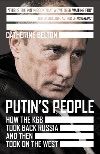US and Western sanctions against Vladimir Putin could be disastrous for Geneva
Possible sanctions on Vladimir Putin could have serious repercussions for Geneva.
Speaking to reporters on Tuesday, President Biden answered “yes,” when asked whether Washington could consider sanctioning the Russian president personally in the event of an invasion. But if personal sanctions have been imposed before on heads of state or government, targeting the head of a permanent member of the UN Security Council would be an unprecedented move, dangerously upping the ante. It could have highly disruptive consequences for the entire UN—no doubt precipitating a crisis for the organization.
Sanctioning Putin could cripple an already weakened multilateral system. Gone would be the West’s hopes of reviving the Iranian nuclear deal. Serious tensions would immediately flare between Europe, the US, and their allies, just at the moment when there seems to be a sense of unity around their concerted response to the Ukrainian crisis. Western leaders might be hesitant to meet with a sanctioned president, and Putin himself might be restricted in his travels. Aware of consequences such as these, the Biden administration will have to carefully calibrate any sanctions that it might eventually impose on Vladimir Putin in the event of an invasion of Ukraine.
“Should this happen, sanctions against Putin himself will likely be symbolic,” a member of the Geneva financial community, with a deep level of expertise on Ukraine’s and Russia’s economy, tells The Geneva Observer. “His two daughters [widely reported to be living in Switzerland] would be directly impacted.” But the most affected, he tells us, would be “the Geneva-based companies active in the energy sector at the heart of the Russian economy.”
In Putin’s People: How the KGB Took Back Russia and Then Took On the West, Catherine Belton describes Geneva as the “outpost of Putin’s oil wealth.” The meticulously researched book (by the former Moscow Bureau Chief for The Financial Times) documents in detail how Putin, from his early days as a KGB agent in Dresden before the fall of the Berlin wall (and with the help of the Stasi), started setting up a network of companies to transfer millions to Switzerland, Liechtenstein, and Asia. These companies, Belton writes, became “central cogs in the influence operations of the Putin regime”—companies such as Gunvor, which back in the early 2000s was “sinking roots deep into Switzerland,” she writes.
“American and Western sanctions would also have a major impact on Geneva-based commodity trading firms, like Vitol and Trafigura or Norilsk Nickel,” our source tells The G|O. This is due to “the enormous Russian economic footprint here; from the banks who would have to sever their relations with Russian companies under sanctions, to the law firms and the myriad of companies that service them, the cascading ripple effects on the Canton’s economy would be profound.” As our source summarizes, “Jobs would go.”

